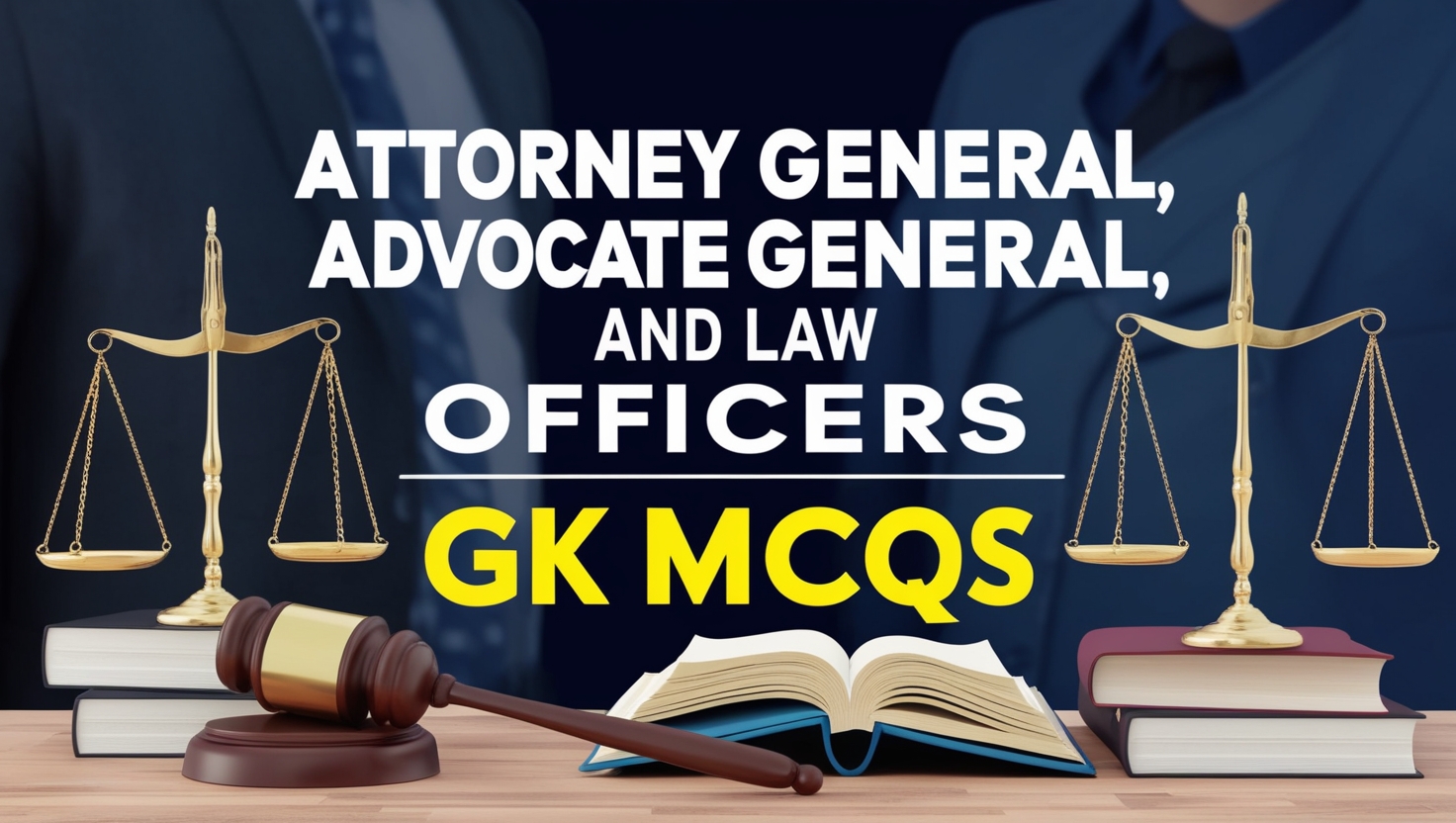
In this article titled Attorney General, Advocate General and other Law Officers GK MCQs With Answer & Explanation in English, we delve into the key roles and responsibilities of India’s top legal officers.
Through a series of well-researched multiple-choice questions (MCQs), readers will gain a deeper understanding of the Attorney General, Advocate General, and other law officers, along with their functions in the Indian legal system. This comprehensive guide provides detailed answers and explanations to enhance your knowledge and prepare for competitive exams.
1. In which article of the Constitution of India is the office of the Attorney General for India provided?
- Article 75
- Article 76
- Article 77
- Article 78
Show Answer
Answer: Article 76
The Constitution of India in Article 76 has provided for the office of the Attorney General for India. The Attorney General is designated as the highest law officer in the country.
2. Who appoints the Attorney General (AG) of India?
- President
- Supreme Court
- Prime Minister
- Lok Sabha
Show Answer
Answer: President
The Attorney General of India is appointed by the President of India and must be a person qualified to be appointed as a judge of the Supreme Court of India.
3. What is the term of the Attorney General of India?
- 2 years
- 3 years
- 5 years
- None
Show Answer
Answer: None
The Constitution does not specify the procedure and grounds for the removal of the Attorney General. He holds office at the pleasure of the President and can resign by submitting his resignation to the President.
4. The Attorney of India submits his resignation to which of the following?
- President
- Prime Minister
- Speaker
- Chief Justice of India
Show Answer
Answer: President
The Attorney General of India may quit his office by submitting his resignation to the President of India. Conventionally, he resigns when the government (council of ministers) resigns or is replaced, as he is appointed on its advice.
5. Which of the following appears on behalf of the Government of India in all cases in the Supreme Court in which the Government of India is concerned?
- Law Minister
- Attorney General
- Advocate General
- Chief Justice of India
Show Answer
Answer: Attorney General
The President of India has assigned the duty of the Attorney General to appear on behalf of the Government of India in all cases in the Supreme Court in which the Government of India is concerned.
6. Which of the following statements are correct with respect to the Attorney General of India?
- He does not enjoy all the privileges and immunities that are available to a member of Parliament.
2. He has the right of audience in all courts in the territory of India.
3. He has the right to speak and to take part in the proceedings of both the Houses of Parliament.
Choose the right option:
- Only 1
- Only 1 & 2
- Only 2 & 3
- 1, 2 & 3
Show Answer
Answer: 1, 2 & 3
Attorney General of India has the right of audience in all courts in the territory of India. He also has the right to speak and to take part in the proceedings of both the Houses of Parliament. And he enjoys all the privileges and immunities that are available to a member of Parliament in India.
7. Which of the following statements is correct regarding the Attorney General of India?
- He is not debarred from private legal practice.
2. He is a full-time counsel for the Government.
3. He falls in the category of government servants.
Choose the right option:
- Only 1
- Only 1 & 2
- Only 3
- 1, 2 & 3
Show Answer
Answer: Only 3
The Attorney General of India is not a full-time counsel for the Government of India. He does not fall in the category of government servants. Also, he is not prohibited from private legal practice.
8. Which of the following assist the Attorney General in the fulfilment of his official responsibilities?
- Chief Justice of India
2. Solicitor General of India
3. Additional Solicitor General of India
Choose the right option:
- Only 1
- Only 1 & 2
- Only 1 & 3
- 1, 2 & 3
Show Answer
Answer: Only 1 & 2
There are other law officers of the Government of India in addition to the Attorney General. They are referred to as the solicitor general of India and additional solicitor general of India. They assist the Attorney General in the fulfilment of his official responsibilities.
9. Which article of the Constitution of India mentions the powers, privileges, and immunities of the Attorney-General of India?
- Article 101
- Article 103
- Article 104
- Article 105
Show Answer
Answer: Article 105
The Article 105 of the Constitution of India mentions about the powers, privileges, and immunities of the Attorney-General of India. Whereas the rights of the Attorney-General as respects the Houses of Parliament and its Committee are stated in Article 88.
10. Which article of the Indian Constitution provides for the office of the advocate general for the states?
- Article 165
- Article 170
- Article 175
- Article 180
Show Answer
Answer: Article 165
The Constitution of India in Article 165 has provided for the office of the advocate general for the states. The Advocate General is the highest law officer in the state.








Leave a Reply